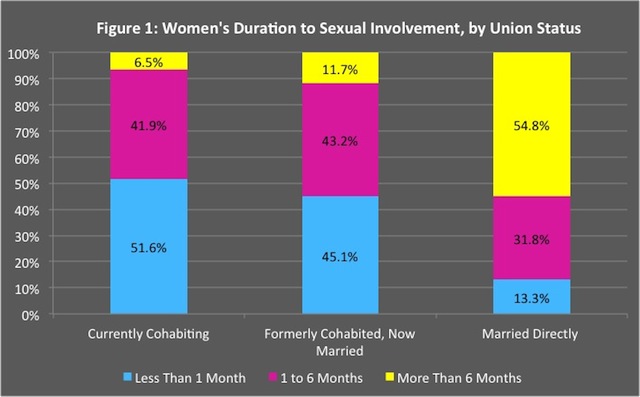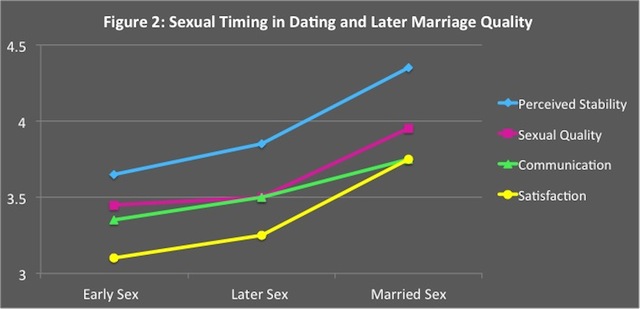When Dating After Sex for the First Time How Long Do You Wait to Do It Again
Is information technology better to assess sexual compatibility early in dating or to delay having sexual practice? Does "true honey expect" or should you "test drive" a relationship before proverb I practise? These are important questions to ask since most single adults study that they desire to one day have a successful, lifelong union—and while dating, many couples move chop-chop into sexual relationships. In fact, as noted in Figure 1, recent studies have found that between xxx and 40% of dating and married couples study having sex inside 1 month of the get-go of their relationship, and the numbers are fifty-fifty higher for currently cohabiting couples.

Source: Adapted from Sassler, S., Addo, F. R., & Lichter, D. T. (2012). The Tempo of Sex activity and Later Relationship Quality. Journal of Marriage and Family, 74, 708-725.
Annotation: Data are from the Marital and Human relationship Survey. Come across Figure 1 in Sassler et al. (2012) for total details of these analyses.
Are these dating patterns compatible with the desire to have a loving and lasting union later? Let'due south take a await at what research tells us about these questions.
Sexual Chemistry vs. Sexual Restraint
The current dating culture oftentimes emphasizes that two people should test their "sexual chemistry" before committing to each other. This type of compatibility is frequently mentioned as an essential characteristic for people to seek out in romantic relationships, particularly ones that could lead to matrimony. Couples who do notexam their sexual chemical science prior to the commitments of exclusivity, appointment, and wedlock are often seen as putting themselves at risk of getting into a human relationship that will not satisfy them in the future—thus increasing their probability of later marital dissatisfaction and divorce.
Notwithstanding, ii recently published studies phone call into question the validity of testing sexual chemistry early in dating.
The longer a dating couple waits to have sex, the meliorate their human relationship is later marriage.
My colleagues and I published the first written report a few years ago in the American Psychological Association'sJournal of Family Psychology. This study involved a national sample of two,035 married individuals who participated in the pop online couple cess survey chosen "Relate." We establish that the longer a dating couple waits to have sex, the better their human relationship is later spousal relationship. In fact, couples who wait until marriage to accept sexual practice report higher human relationship satisfaction (twenty% college), better communication patterns (12% amend), less consideration of divorce (22% lower), and better sexual quality (xv% better) than those who started having sexual activity early in their dating (see Effigy 2). For couples in betwixt—those that became sexually involved afterwards in their dating, but prior to marriage—the benefits were most half every bit strong.

Source: Adapted from Busby, Carroll, and Willoughby (2010). Compatibility or restraint? The effects of sexual timing on marriage relationships. Journal of Family Psychology, 24, 766 – 774.
Note: Figure depicts mean scores reported by spouses in three sexual timing groups on human relationship satisfaction, perceived relationship stability, sexual quality, and advice. To compare these 3 groups, the authors conducted a Multivariate Analysis of Covariance controlling for religiosity, relationship length, teaching, and the number of sexual partners. The results from the MANCOVA indicated that Sexual Timing Group and Gender had a significant consequence on the dependent variables while holding the control variables constant. The means displayed here demonstrate that the Sexual Timing Group that participants belonged to had the strongest clan with Perceived Relationship Stability and Satisfaction every bit all 3 groups were significantly different from each other. In other words, the longer participants waited to be sexual, the more stable and satisfying their relationships were in one case they were married. Gender had a relatively small influence on the dependent variables. For the other dependent variables, the participants who waited to be sexual until subsequently marriage had significantly higher levels of advice and sexual quality compared to the other two sexual timing groups. See Table 3 in Busby et al. (2010) for full details of these analyses.
These patterns were statistically significant fifty-fifty when controlling for a variety of other variables such as respondents' number of prior sexual partners, pedagogy levels, religiosity, and human relationship length.
The second study, by Sharon Sassler and her colleagues at Cornell Academy, also found that rapid sexual involvement has adverse long-term implications for relationship quality. Using data from the Marital and Relationship Survey, which provides information on nearly 600 low- to moderate-income couples living with pocket-sized children, their study examined the tempo of sexual intimacy and subsequent relationship quality in a sample of married and cohabiting men and women. Their analyses too suggest that delaying sexual interest is associated with higher human relationship quality across several dimensions.
They discovered that the negative association betwixt sexual timing and relationship quality is largely driven by a link between early sex and cohabitation. Specifically, sexual interest early on in a romantic relationship is associated with an increased likelihood of moving more quickly into living together, which in turn is associated with lower relationship quality. This finding supports Norval Glenn's hypothesis that sexual involvement may atomic number 82 to unhealthy emotional entanglements that make ending a bad relationship hard. As Sassler and her colleagues concluded, "Acceptable time is required for romantic relationships to develop in a healthy style. In contrast, relationships that move too quickly, without adequate word of the goals and long-term desires of each partner, may be insufficiently committed and therefore upshot in human relationship distress, especially if one partner is more than committed than the other" (p. 710).
So, why might sexual restraint benefit couples during dating and later in marriage? Evidence points to two primary explanations for why couples do good from waiting to become sexually involved:intentional partner selection andsexual symbolism.
Intentional Partner Choice
A primary reason why sexual restraint benefits couples is that it facilitates intentional partner pick. Simply put, you have a improve risk of making skillful decisions in dating when you have not go sexually involved with your dating partner. Leading union expert Scott Stanley, a frequent contributor to this blog, has proposed a concept of dating that he calls "human relationship inertia." The central idea of inertia is that some couples cease up married partly because they go "prematurely entangled" in a sexual relationship prior to making the determination to be committed to one another—and had they not go so entangled early on, they would not have married each other. Inertia ways that it is hard for some couples to veer from the path they are on, even when doing and then would be wise; the fact that they share friends, an apartment, and maybe a pet make breaking upwards with each other even more hard than it would otherwise exist, and then the human relationship progresses from cohabitation to marriage even if the partners are not very well matched.
A master reason why sexual restraint benefits couples is that it facilitates intentional partner selection.
For many young adults, the single life has become synonymous with hook-ups and sexual experimentation. The problem with these patterns is that proper partner choice is oft difficult for sexually involved couples who experience strong physical rewards with each other, as these rewards can crusade them to ignore or minimize deeper incompatibilities in the relationship. The human brain and torso do not just experience pleasance during sex; they likewise experience strong sensations of zipper and bonding. Simply put, we are hardwired to connect. Rapid sexual initiation frequently creates poor partner option because intense feelings of pleasance and attachment can be confused for true intimacy and lasting love. Early sexual practice creates a sort of counterfeit intimacythat makes two people call up they are closer to each other than they really are. This can cause people to "fall in love" with, and possibly even marry, someone who is non a good selection for them in the long run.
Sexual Symbolism and Lasting Beloved
Sexual restraint also benefits couples because it requires partners to prioritize advice and commitment equally the foundation of their attraction to each other. This gives couples a dissimilar type of foundation from couples who build their human relationship on concrete attraction and sexual gratification. This difference becomes particularly disquisitional equally couples naturally move past an initial period of intense allure and excitement into a relationship more characterized by companionship and partnership. As Dr. Marking Regnerus, author ofPremarital Sex activity in America, explains, "couples who striking the honeymoon as well early—that is, prioritize sex promptly at the offset of the relationship—often find their relationship underdeveloped when it comes to qualities that brand relationships stable and spouses reliable and trustworthy." Couples who have sexual activity early in their relationship are at risk of developing lopsided commitment levels (i.e., the adult female is more than committed than the man), less salubrious communication patterns, and less power to manage differences and conflict.
Sexual restraint allows couples to focus on and evaluate the emotional aspects of their human relationship.
The value of sexual restraint for committed couples moving toward marriage is best understood when couples appreciate that emotional intimacy is the truthful foundation of sexual intimacy in a healthy marriage. Emotional intimacy exists in a relationship when 2 people experience a sense of security, back up, trust, comfort, and prophylactic with one some other. In dating, focusing on emotional intimacy is a procedure of coming to know each other from the within-out, not just the outside in. Sexual restraint allows couples to focus on and evaluate the emotional aspects of their relationship.
By gaining a deeper agreement of emotional intimacy, dating couples can more fully capeesh the principle of sexual symbolism. Ultimately, loving and lasting marriages are ones where the sexual intimacy is a meaningful physical symbol of the emotional intimacy shared between the spouses. Without this, sex is merely physical and lacks the significant needed to exist truly satisfying over the long term. In dating, couples who hope to marry should focus on developing a foundation of friendship and communication that will serve every bit the ongoing foundation for sexual intimacy in their wedlock. By practicing sexual restraint, couples permit themselves to focus on a true foundation of intimacy: acceptance, understanding, partnership, and love.
So, while truthful love does indeed expect, it may actually piece of work the other manner around: waiting helps create true love.
Jason S. Carroll, Ph.D., is a professor in the School of Family unit Life at Brigham Young University.Recently, Dr. Carroll received the Berscheid-Hatfield Award for Distinguished Mid-Career Accomplishment, a biennial award given for distinguished scientific accomplishment by the International Association for Relationship Research.
Source: https://ifstudies.org/blog/slow-but-sure-does-the-timing-of-sex-during-dating-matter
0 Response to "When Dating After Sex for the First Time How Long Do You Wait to Do It Again"
Post a Comment